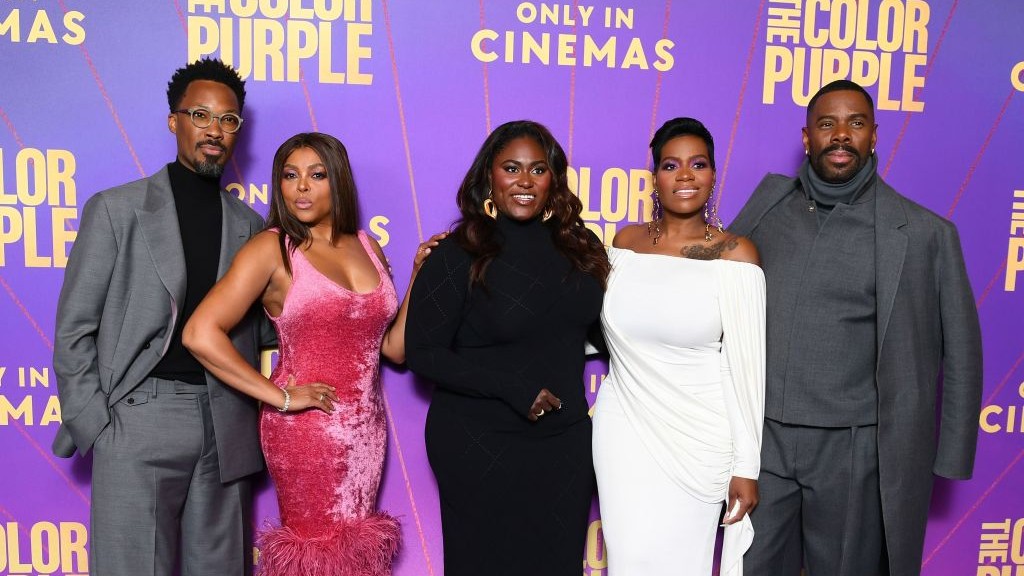40 years of 'The Color Purple' backlash
Beloved and decried, the novel and films have always struck a nerve


A free daily email with the biggest news stories of the day – and the best features from TheWeek.com
You are now subscribed
Your newsletter sign-up was successful
The latest film adaptation of "The Color Purple" came out on Dec. 25. And in a kind of cultural déjà vu, a new breed of detractors have been up in arms, just as critics of "The Color Purple" were when Alice Walker's novel was released in 1982 and when Steven Spielberg's film debuted in 1985.
Four decades of fandom; four decades of criticism: "The Color Purple" has been a cultural flashpoint almost since the beginning.
The novel
Because of the decades-long presence of the first "The Color Purple" film and the controversy surrounding that adaptation, it is difficult to separate the original response to the novel from the ensuing brouhaha. "'The Color Purple,' novel and film, became inflammatory subject matter because there were those who did not like them rather than because the content of the works was offensive to everyone in the audience," noted Jacqueline Bobo in "Callaloo" in 1989. "The distinction is a subtle and fine one, yet is important. If a cultural product is presented as controversial, this view affects the way in which it is perceived and its worth evaluated, initially, by an audience."
The novel won both the National Book Award and the Pulitzer Prize in 1983, and it has long resonated with audiences, especially Black women. Fast forward to the years after the 1985 film's debut, and the novel has appeared in three decades of the American Library Association's 100 Most Frequently Challenged Books because of its depictions of domestic abuse and homosexuality.
The Week
Escape your echo chamber. Get the facts behind the news, plus analysis from multiple perspectives.

Sign up for The Week's Free Newsletters
From our morning news briefing to a weekly Good News Newsletter, get the best of The Week delivered directly to your inbox.
From our morning news briefing to a weekly Good News Newsletter, get the best of The Week delivered directly to your inbox.
The 1985 Steven Spielberg film
The first film adaptation of "The Color Purple" has achieved iconic status since its debut in December 1985. The Celie finger; Sofia, as portrayed by Oprah Winfrey, exclaiming the "You told Harpo to beat me" monologue: Some of the film's moments are fixed in movie history. Nonetheless, the kickback swept in hard during the beginning months of 1986, and many of the complaints came from Black male artists and thinkers. They, much like the novel's detractors, decried the movie's representation of Black men and also its being directed by a white man, Steven Spielberg. Spike Lee, in "Film Comment," stated that Hollywood only greenlit the movie because the men in "The Color Purple" were depicted as "one-dimensional animals."
Whoopi Goldberg, who played Celie in the 1984 film adaptation, recalled the uproar from Black male filmmakers years later, saying, "I was really pissed off. I was like, 'Well, why didn't you make the movie? John? Spike? Luke and Jesus?'" The NAACP soon began protesting the film. "The Color Purple" was nominated for 11 Oscars in 1986 — and won none.
The 2023 Blitz Bazawule musical film
This go-round, "The Color Purple" is experiencing one fresh kind of controversy and one familiar backlash, albeit amplified.
One of the gripes is about the latest film being a musical. The comedian D.L. Hughley cracked on Threads, "Wow! As brutal a story as it is The Color Purple is a musical?? What's next Amistaad on Ice!"

The latest film's Celie, Fantasia Barrino Taylor, has expressed how powerful the musicalized approach is for a character who spends much of the story dehumanized. "Our director, Blitz [Bazawule] — our amazing director — gave Celie an imagination," noted Barrino Taylor recently on CBS Mornings. As such, the audience can "see how Celie processes" everything that happens to her. Hate on musicals all you like, there remains an artistic reason for this "The Color Purple" singing.
The relationship between Celie and Shug Avery, the alluring chanteuse played by Taraji P. Henson, in this version plays a mite truer to that of the novel. The sexuality — and sexualness — is heightened rather than downplayed as it was in the 1985 film, and some viewers are distressed. Rapper Boosie BadAzz and actress TS Madison battled on X after Boosie BadAzz posted that he walked out of "The Color Purple" because he didn't want his daughter watching a physical relationship between two women. Madison noted that the rapper seemed fine then with his daughter watching all the abuse that happened to Celie earlier in the film.
A free daily email with the biggest news stories of the day – and the best features from TheWeek.com
I feel that if we can’t get the portrayal of Celie & Shug’s lesbian relationship right, then we miss a critical part of Celie’s character development & the subversive message Walker is making about the redemptive potential of the erotic in black women’s relationships.December 27, 2023
One of the core messages of the novel is that there is power embedded in the relationships between Black women. Developing the bond between Celie and Shug Avery in the latest film adaptation allows that message to bloom. Lorna of @consciouslyblvk said on X that not showing the intimate connection between Celie and Shug means "missing the subversive message Walker is making about the redemptive potential of the erotic in black women's relationships."
Scott Hocker is an award-winning freelance writer and editor at The Week Digital. He has written food, travel, culture and lifestyle stories for local, national and international publications for more than 20 years. Scott also has more than 15 years of experience creating, implementing and managing content initiatives while working across departments to grow companies. His most recent editorial post was as editor-in-chief of Liquor.com. Previously, he was the editor-in-chief of Tasting Table and a senior editor at San Francisco magazine.
